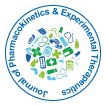Nuestro grupo organiza más de 3000 Series de conferencias Eventos cada año en EE. UU., Europa y América. Asia con el apoyo de 1.000 sociedades científicas más y publica más de 700 Acceso abierto Revistas que contienen más de 50.000 personalidades eminentes, científicos de renombre como miembros del consejo editorial.
Revistas de acceso abierto que ganan más lectores y citas
700 revistas y 15 000 000 de lectores Cada revista obtiene más de 25 000 lectores
Indexado en
- Búsqueda de referencia
- Universidad Hamdard
- EBSCO AZ
- publones
- ICMJE
Enlaces útiles
Revistas de acceso abierto
Comparte esta página
Abstracto
The Role of ABC Efflux Transporter in Treatment of Pharmaco-Resistant Schizophrenia: A Review Article.
Alemayehu D, Melisie G, Taye K and Ta
A large percentage of schizophrenic patients respond poorly to antipsychotic treatment. This could be explained by inefficient drug transport across the blood-brain barrier due to ABC efflux transporter, in particular, P-glycoprotein, mediated efflux. P-glycoprotein (P-gp) activity and expression in the blood-brain barrier can be affected by genetics (polymorphism), inflammation and pharmacotherapy. The level of expression of P-gp at BBB is thought to be one of the factors contributing for pharmaco-resistant schizophrenia. Despite the differences in the experimental set-up that partly explain the controversies regarding the interaction between P-gp and antipsychotics, it is feasible to say that the majority of the antipsychotics have shown (mostly weak) affinity as a P-gp substrate and that most have a weak inhibitory effect on P-gp in vitro. The three major Single Nucleotide Polymorphisms (SNPs) in protein coding region at C3435T, G2677T, and C1236T of ABCB1 at BBB have been associated with efflux pump efficiency and with predicting changes in the function of P-gp that determines the inter-cerebral concentration and therapeutic response in human studies to anti-psychotics unlike serum concentration of these agents.
Revistas por tema
- Agricultura y acuicultura
- Alimentación y Nutrición
- Bioinformática y biología de sistemas
- Bioquímica
- Ciencia de los Materiales
- Ciencia general
- Ciencias Ambientales
- Ciencias Clínicas
- Ciencias farmacéuticas
- Ciencias Médicas
- Ciencias Sociales y Políticas
- Ciencias Veterinarias
- Enfermería y atención sanitaria
- Física
- Genética y biología molecular
- Geología y Ciencias de la Tierra
- Ingeniería
- Inmunología y Microbiología
- Química
Revistas clínicas y médicas
- Anestesiología
- Biología Molecular
- Cardiología
- Cirugía
- Cuidado de la salud
- Dermatología
- Diabetes y Endocrinología
- Enfermedades infecciosas
- Enfermería
- Gastroenterología
- Genética
- Inmunología
- Investigación clínica
- Medicamento
- Microbiología
- Neurología
- Odontología
- Oftalmología
- Oncología
- Pediatría
- Toxicología

 English
English  Chinese
Chinese  Russian
Russian  German
German  French
French  Japanese
Japanese  Portuguese
Portuguese  Hindi
Hindi